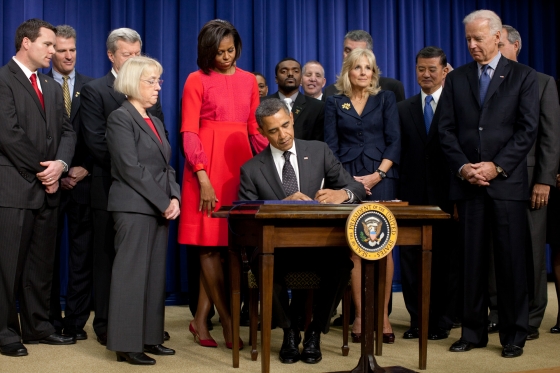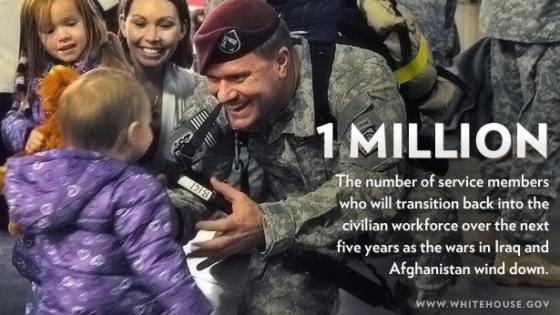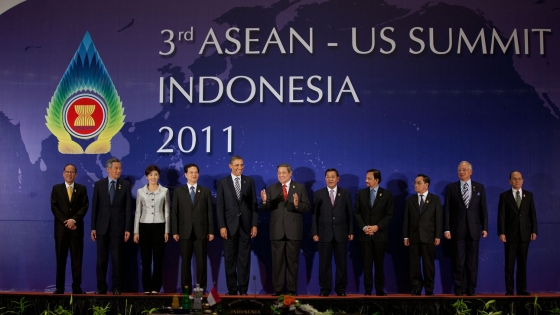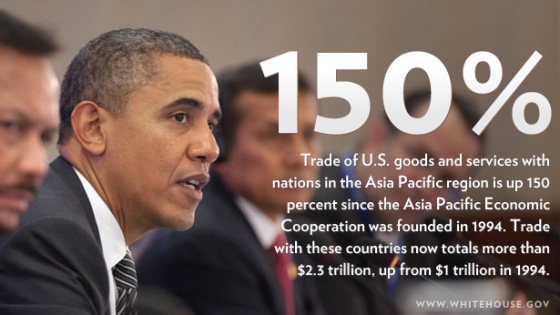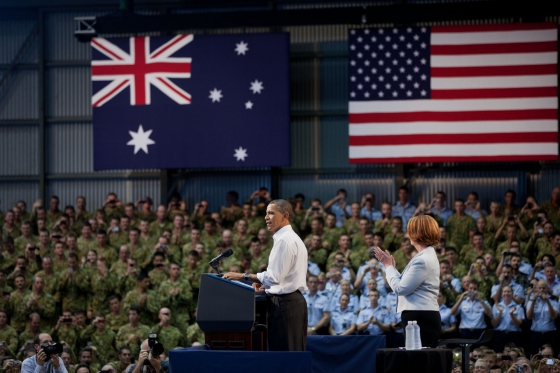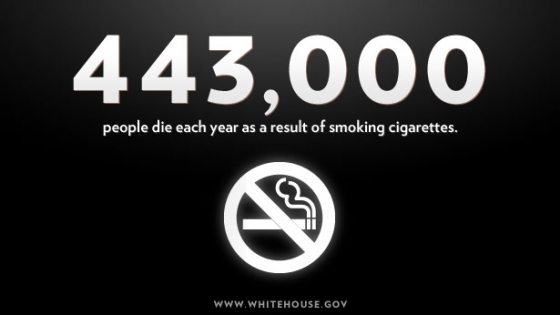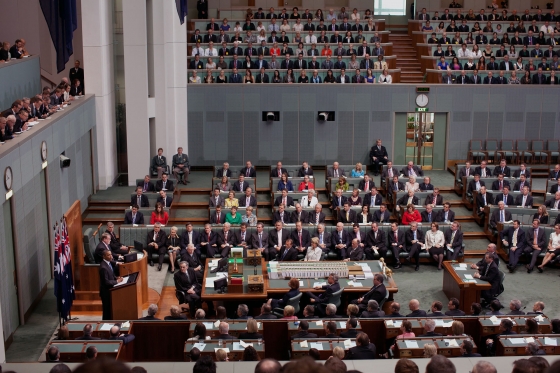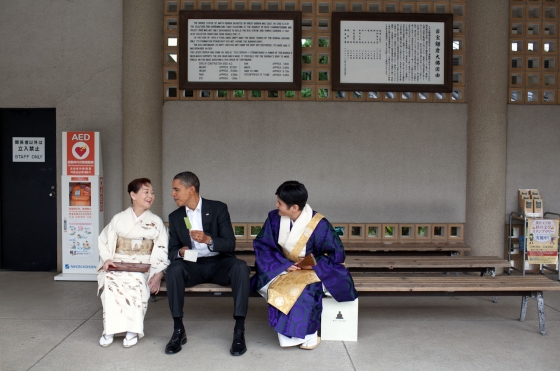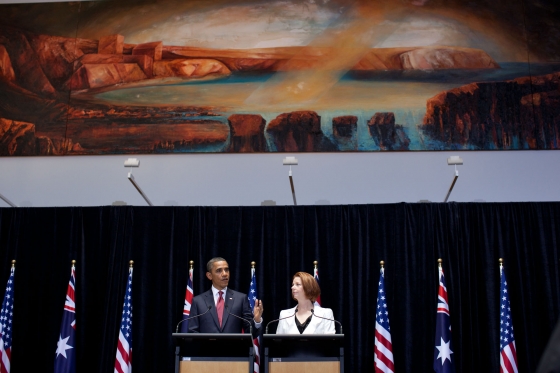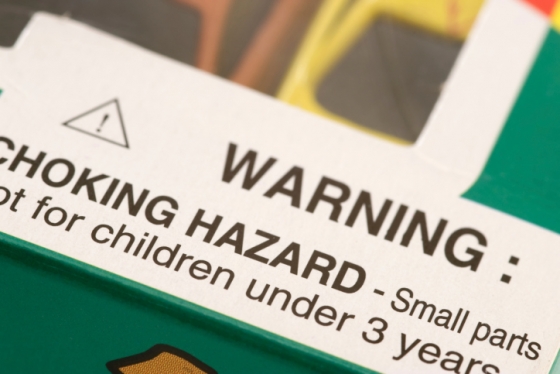-
This morning, President Obama signed the "VOW to Hire Heroes Act" into law, telling those in attendance:
Back in September, I sent Congress a jobs bill. And in it, I proposed a tax credit for any business that hires a veteran who’s been unemployed for at least four weeks. I proposed an even bigger tax break if a business hires a veteran who’s been unemployed for at least six months. And if a business hires an unemployed veteran with a disability related to their service, I proposed doubling the tax break that we already have in place.
Today, because Democrats and Republicans came together, I’m proud to sign those proposals into law. And I urge every business owner out there who’s hiring to hire a veteran right away.
The is just one of the intiatives the President has enacted in order to ensure that the country fulfills its obligation to our servicemembers and their families.
And it's just one part of the President's plan to put the American people back to work. At the bill signing, he told lawmakers that families all over the country are demanding the same kind of bold, bipartisan action.
"My message to every member of Congress is keep going," President Obama said, "Keep working."
Read more:
- Tax credits for employers who hire unemployed veterans and veterans with service-connected disabilities are just one important part of the Obama Administration's plan to to help veterans translate their military skills for the civilian workforce. New online tools are available to aid their search for jobs, and the Administration has partnered with the Chamber of Commerce and the private sector to make it easier to connect our veterans with companies that want to hire them.
- Read the story of Jason Hansman, who managed hundreds of reconstruction projects that totaled millions of dollars while serving in Iraq, but receieved only one job offer, to fill a night mall cop position.
- Read the story of Navy veteran Eric Smith, who has more than five years experience as a military medic, but works today as a hospital janitor.
- Read the story of Maria Canales, an Army veteran who spent nearly four years looking for a job because she had trouble communicating how the skills she learned in the military prepared her to be an excellent employee in the civilian workforce.
-
We have all heard about the compelling attributes my fellow service members bring to the table when they look for jobs as they transition out of the military – leadership experience, goal-oriented, can-do attitude, great work ethic, etc. Yet we have also heard about the disturbing unemployment statistics for today’s youngest veterans – those in the 24-36 age group. How can this be true, and what is this Administration doing about it?
Unfortunately, our youngest veterans are entering the private workforce at a very challenging time. Many of them are likely to be employed in industries such as construction, manufacturing and transportation, which have all struggled in the last few years. Further, many of these vets come from and return to rural parts of the country, and do not have the benefit of a college degree. Another critical issue is that there currently does not exist a truly effective and cohesive transition assistance program for them. And on top of all that, a staggering number of our returning service members suffer from behavioral health issues, including Post Traumatic Stress, but these issues are not being adequately addressed. The unemployment of today’s young vets is very complicated and cannot be considered in a vacuum.
I was honored to stand behind President Obama today as he signed into law his job bill for military veterans. In a nutshell, this law encourages private industry to hire unemployed veterans and wounded warriors through several generous tax credits. On its own, the law is not an overall panacea to our veterans’ unemployment problems; when considered together with other related initiatives announced by President Obama however, the public-private partnership it fosters will certainly be a big help. And this is critical, because as we end the war in Iraq and wind down the war in Afghanistan, over one million service members are projected to leave the military between 2011 and 2016.
Some of these far-reaching initiatives include: a challenge to the private sector to hire or train 100,000 unemployed veterans or their spouses by the end of 2013; “Gold Cards” issued to service members in transition to help jump-start their job search process; the Veterans Job Bank connecting unemployed vets to job openings with companies that want to hire them; My Next Move for Veterans; and an interagency task force is now developing reforms to ensure that every service member receives the training, education and credentials they need for a successful transition.
-
Through the course of the past decade, nearly 3 million veterans have transitioned back to civilian life. As the wars in Iraq and Afghanistan draw to a close, more than a million more service members will join them.
Each of these individuals is highly-trained, highly-skilled, and motivated. They represent some of the best America has to offer.
As a nation, we owe an obligation to these heroes, and it's easy to see how we'll benefit as much from their contributions to the civilian workforce as we have from their service in the military.
That's why creating jobs for veterans has been a major priority for President Obama.
Under his direction, the federal government has hired more than 120,000 vets. Joining Forces, led by the First Lady and Dr. Jill Biden, has organized an initative through which private businesses have pledged to hire an additional 135,000 servicemembers and military spouses. And the Obama administration has set up a series reforms and programs to help veterans get back to work -- you can learn more by visting whitehouse.gov/vets.
Today, President Obama will take another step to help fulfill our obligation to those who wear the uniform of the United States when he signs legislation to create a pair of tax credits for businesses that hire veterans.
Throughout the day, we'll share stories of veterans who will benefit from these measures. Be sure to check it out.
-
November 21, 2011
10:23 AM EDTToday is a historic day for veterans of Iraq and Afghanistan. When President Obama signs the VOW to Hire Heroes Act into law, an entire generation of new vets will be provided much-needed practical support to transition from combat to careers. As an Iraq vet I am privileged to lead the membership team at Iraq and Afghanistan Veterans of America (IAVA), the country’s first and largest nonpartisan organization committed to our newest veterans. And I speak for all of us when I thank the lawmakers who worked so hard together, putting aside party, to get this bill passed. We also thank the President for his leadership on the issue - for acting so quickly on this legislation and for bringing national attention to the veterans’ unemployment crisis.
Some 240,000 young vets were out of work in September 2011 alone, and with the Iraq War set to end in two months, a surge of troops will be returning home. And most of them will be looking for work.
There are moral and patriotic reasons to care for returning combat vets. But hiring vets is also smart business. The hundreds of combat patrols they’ve been on may not mean much to a civilian employer, but the millions of dollars of equipment, complex planning and logistic they had responsibility for should.
Take my story, for example. I served in Iraq as a proud noncommissioned officer in the Army from 2004-2005, managing hundreds of reconstruction projects in a Civil Affairs company that totaled millions of dollars. Armed with that experience and a political science degree from the University of Washington, I entered the civilian job market in 2008 with a solid resume. Yet after nine months and 375 resumes sent out, I only received one interview request – from a temp agency, looking to fill a night mall cop position.
I took that job, with drive and resolve. Vets tend not to make excuses and whine about employment prospects. We learned in the military that all jobs deserve attention and respect. But security is not what I wanted to do. And I think it’s fair to say I deserved different opportunities. I wanted opportunities that would utilize my potential as a leader, my schooling, and my experiences in the Army. My generation of vets grew up learning how to save lives, build roads and schools, negotiate with the local community, and work with a team - all while under fire. We’ll certainly be able to handle the worst the civilian world can throw at us, but we need a foot in the door first. That’s why the VOW to Hire Heroes Act is so important. The tax credits for employers should get employers’ attention and open the door. Once in, we can take it from there. We’ll deliver.
The time for America’s economic revival is now. And like our grandparents before us, it’ll be another Greatest Generation leading the way.
-
From Indonesia, President Obama talks about his administration's work opening up markets to support thousands of American jobs and keep us on track to double American exports by 2014.
Transcript | Download mp4 | Download mp3
-
President Obama is in Indonesia for the East Asia Summit. He's the first American president to attend the conference.
There, he's held bilateral meetings with the leaders of India, Indonesia, Malaysia, and the Philippines.
He's announced that Secretary of State Hillary Clinton will visit Burma to discuss that country's efforts to institute important, democratic reforms.
But much of his work was focused on helping to open up markets to American exports. On this trip, the President was able to announce business deals worth at least $25 billion between American companies and countries in the region.
Those transactions will help to support around 127,000 American jobs.
-
Trade of U.S. goods and services with nations in the Asia Pacific region is up 150 percent since the Asia Pacific Economic Cooperation was founded in 1994. Trade with these countries now totals more than $2.3 trillion, up from $1 trillion in 1994.
President Obama, who is on the final leg of his Asia Pacific trip, has noted that the region’s tremendous economic growth and large and growing middle class makes the area a key market for U.S. exports. His work over the last week at the APEC, ASEAN, and East Asia Summits was an important step in expanding our economic partnerships with these trading partners, as well as our ability to create jobs, which exports to Asia Pacific countries are generating in every corner of the United States across every major sector.
Read more about the President’s Asia Pacific trip.
-
November 18, 2011
05:39 PM EDTThe President in the Pacific: President Obama embarked on a nine day Asia Pacific tour focused on strengthening economic ties and renewing strategic relationships in the region. From November 11th through November 19th, the President visited Hawaii, Australia, and Indonesia. While on the road, he spoke at the Asia-Pacific Economic Cooperation, met with Australian Prime Minister, addressed Australian Parliament, spoke with Australian troops and U.S. Marines, and attended the East Asia Summit.
Cleaner Air: The Obama Administration announced a joint proposal to save American families money at the pump, reduce our country’s dependence on oil, and boost domestic manufacturing. The Environmental Protection Agency (EPA) and the Department of Transportation (DOT) announced the next steps toward setting stronger fuel economy and greenhouse gas pollution standards for model year 2017-2025 passenger cars and light-duty trucks.
Cancer Awareness: President Obama congratulated those who participated in American Cancer Society’s 36th annual Great American Smokeout, a challenge to smokers to kick their tobacco habit. An estimated 443,000 people in the United States die each year due to cigarettes and tobacco use is still considered one of the leading causes of death in the U.S. President Obama--a former smoker himself--and his Administration continue to make progress in reducing the number of Americans who smoke.
Carrier Classic: Over Veterans Day weekend, President Obama and the First Lady attended the first-ever Carrier Classic aboard the USS Carl Vinson where they watched University of North Carolina men’s basketball team defeat Michigan State. The game had more than 8,000 people in the stands – most of whom were servicemembers.
-
On November 18, 2010 Vice President Biden joined thousands of people from around the country in telling LGBT young people that “It Gets Better.”
The teenage years are a difficult time in anyone’s life. But those years are much harder to endure for young people who are gay, lesbian, bisexual, or transgender and face bullying and harassment from their own peers as a result. The It Gets Better campaign was created after a spate of bullying-related suicides to tell these young people that life has far more in store for them.
Vice President Biden knows what it’s like to be bullied. “They made fun of me because I stuttered,” he said in his video message. “And it hurt.”
Through the support of his parents, the Vice President said he was able to recognize that “the fact that I stuttered didn’t make me less bright, it didn’t make me less worthy or less of a person.”
He reminded young people that “one day not long from now you’re going to look back on this time in your life, and you’ll be incredibly proud that you’re able to get through it, too.”
“Things do get better,” he said. “You might not be able to see it right now, but it’s there and it’s waiting for you.”
Watch President Obama and other Administration officials tell young people It Gets Better.
-
November 18, 2011
08:50 AM EDTLast week I was in the Republic of Korea to meet with counterparts who are planning the second Nuclear Security Summit in Seoul next March. Preparations are going well, and the South Koreans are gearing up for the formidable task of hosting 50 world leaders. While I was there, I spoke at a UN conference, highlighting progress on nuclear security since the historic first Summit in Washington last April.
Even though I’d been aware of many of these events as they happened, it was really impressive to see the progress piled up: over 400 kg of highly enriched uranium removed from over 10 countries – enough for 16 nuclear bombs. A dozen new countries joining the key international treaties. Over a dozen new nuclear security training and research “centers of excellence” opening their doors. Key tools for international cooperation on nuclear security, such as UN Security Council Resolution 1540 and the G8 Global Partnership Against the Spread of Weapons and Materials of Mass Destruction extended into the next decade. Increased resources for the International Atomic Energy Agency’s support to its member states to improve security on nuclear materials. Tens of tons of Highly Enriched Uranium permanently destroyed by Russia and the US – raw material for thousands of nuclear weapons. Nuclear industry players adopting “Principles of Conduct” including commitments to secure materials at their facilities, and working together through the World Institute of Nuclear Security to identify and promote best practices in nuclear security. INTERPOL setting up a new radiological-nuclear center to bring law enforcement tools to bear more effectively on nuclear smuggling.
These steps are bringing tangible life to President Obama’s words in Prague in April 2009: “we must ensure that terrorists never acquire a nuclear weapon. This is the most immediate and extreme threat to global security….So today I am announcing a new international effort to secure all vulnerable nuclear material around the world within four years. We will set new standards, expand our cooperation with Russia, pursue new partnerships to lock down these sensitive materials. We must also build on our efforts to break up black markets, detect and intercept materials in transit, and use financial tools to disrupt this dangerous trade.… And we should start by having a Global Summit on Nuclear Security that the United States will host within the next year.”
As we work with the South Koreans to prepare the second Summit, we will see much more progress on this global agenda to prevent nuclear terrorism and halt nuclear smuggling.
-
This week, President Obama is in the Pacific. He traveled to Hawaii for the Asia Pacific Economic Cooperation conference, visited Australia for meetings with Prime Minister Julia Gillard and an address to Parliament, and he's currently in Indonesia for the East Asia Summit. We'll be back next week with a special edition of West Wing Week, but for now, check out a few clips from the road.
-
An estimated 443,000 people in the United States die each year due to cigarettes. Although we've known about the harmful effects of tobacco for many decades now, about 46 million Americans still smoke cigarettes. Worse still, one in five kids smokes cigarettes by the time they leave high school.
Today, on the 36th Great American Smokeout, President Obama--a former smoker himself--is urging smokers to quit. And his Administration is committed to stopping kids from using tobacco.
Tobacco use is the leading cause of preventable death and disease, not just in the United States, but around the world. Quitting now reduces risk of cancer, heart and lung disease, and stroke among other illnesses.
To get help quitting or learn more about resources available to help you or someone you know quit, visit the American Cancer Society or SmokeFree.gov.
-
November 17, 2010 was a big day for anyone ever denied access to a sick spouse, partner, or loved one due to discrimination.
On that day, the Centers for Medicare and Medicaid Services announced that all patients in hospitals receiving Medicare and Medicaid funding must be allowed to decide who they want to be at their bedside when they are sick—regardless of race, color, national origin, religion, sex, sexual orientation, gender identity, or disability.
President Obama asked Health and Human Services that visitation rules be amended the previous April:
There are few moments in our lives that call for greater compassion and companionship than when a loved one is admitted to the hospital. In these hours of need and moments of pain and anxiety, all of us would hope to have a hand to hold, a shoulder on which to lean -- a loved one to be there for us, as we would be there for them.
Yet every day, all across America, patients are denied the kindnesses and caring of a loved one at their sides -- whether in a sudden medical emergency or a prolonged hospital stay. Often, a widow or widower with no children is denied the support and comfort of a good friend. Members of religious orders are sometimes unable to choose someone other than an immediate family member to visit them and make medical decisions on their behalf. Also uniquely affected are gay and lesbian Americans who are often barred from the bedsides of the partners with whom they may have spent decades of their lives -- unable to be there for the person they love, and unable to act as a legal surrogate if their partner is incapacitated.
For all of these Americans, the failure to have their wishes respected concerning who may visit them or make medical decisions on their behalf has real consequences. It means that doctors and nurses do not always have the best information about patients' medications and medical histories and that friends and certain family members are unable to serve as intermediaries to help communicate patients' needs. It means that a stressful and at times terrifying experience for patients is senselessly compounded by indignity and unfairness. And it means that all too often, people are made to suffer or even to pass away alone, denied the comfort of companionship in their final moments while a loved one is left worrying and pacing down the hall.
-
Even as President Obama works to end the wars in Iraq and Afghanistan, he's laying the groundwork to prepare America for the decades ahead.
And yesterday afternoon, he told Australian lawmakers that means shifting our attention to the Pacific:
Here, we see the future. As the world’s fastest-growing region -- and home to more than half the global economy -- the Asia Pacific is critical to achieving my highest priority, and that's creating jobs and opportunity for the American people. With most of the world’s nuclear power and some half of humanity, Asia will largely define whether the century ahead will be marked by conflict or cooperation, needless suffering or human progress.
As President, I have, therefore, made a deliberate and strategic decision -- as a Pacific nation, the United States will play a larger and long-term role in shaping this region and its future, by upholding core principles and in close partnership with our allies and friends.The President outlined a framework through which American military strength helps to guarantee security in the region, where growing economic ties help to deliver a shared prosperity, and where renewed diplomatic relationships promote human rights and freedom.
"History is on the side of the free -- free societies, free governments, free economies, free people," President Obama said in Canberra. "And the future belongs to those who stand firm for those ideals, in this region and around the world."
Read the full remarks here.
See more: Check out a slideshow from the President’s trip to Australia.
-
Today, Americans from across the country are making plans to quit smoking as part of the American Cancer Society’s Great American Smokeout. And this morning, we released a video from President Obama congratulating everyone who is participating in this important event and underscoring our Administration’s commitment to fighting tobacco use:
]
President Obama and his Administration are committed to doing all we can to stop kids from smoking and reducing the number of Americans who smoke. And for those of you who are making the commitment to quit, you are not alone and we have resources to help you succeed. You can visit HHS.gov today to connect with a smoking cessation expert via IM or phone, use the online step-by-step quit guide, or sign up for SmokefreeTXT a texted based smoking cessation program. And under the Affordable Care Act insurance companies are required to cover recommended preventive services, including tobacco cessation counseling without charging you an extra penny out of your own pocket.
We are also continuing our efforts to protect young people from starting smoking in the first place.
President Obama was proud to sign the Family Smoking Prevention and Tobacco Control Act which gives us new tools to help young people stop smoking before they start. New prevention efforts include addressing marketing practices aimed at children like banning fruit and candy flavored cigarettes and working with states to keep tobacco out of the hands of kids by increasing enforcement at the retail level. And the law calls for graphic warning labels that make the danger of smoking abundantly clear. Big tobacco companies are trying to stand in the way of these commonsense measures to protect our kids, but we’re confident their attempts will ultimately fail.
Sadly, we’ve seen too many friends, families and communities suffer needlessly, and suffer tremendously, from tobacco-related death, disease and disability. We have a clear path to ending the tobacco epidemic and it is a battle we can – and must - win. The prosperity and health of our country depends on it.
Join me today at 12:45p ET as I talk with iVillage reporter, Kelly Wallace, for a live web chat about tobacco cessation and prevention. To watch live, go to iVillage.com or www.hhs.gov/live. You can submit a question in advance here, or ask a question live during the chat on iVillage’s Twitter or Facebook page.
-
Earlier today I had the opportunity to participate in a meeting of the President’s Export Council (PEC) at the White House. Members of the PEC gathered to strategize and discuss ways to reach the President’s goal of doubling our nation’s exports by the end of 2014. In addition, the private sector members of the PEC presented Administration officials with letters of recommendations on topics such as expansion of the Information Technology Agreement (ITA), Middle East/North Africa commercial engagement and workforce readiness. We thanked them for their ideas, and underscored the importance of their input to the Administration’s efforts to boost exports.
During the meeting I emphasized the milestone we reached with the signing of the recent trade agreements with Korea, Colombia,and Panama,as well as the Trans-Pacific Partnership. Additionally, I highlighted the importance of the work with Congress that lies ahead to terminate the application of the Jackson-Vanik Amendment to Russia now that it will be formally invited to join the World Trade Organization next month.
Other senior officials joining me in today’s meeting were Commerce Secretary John Bryson, Labor Secretary Hilda Solis, Transportation Secretary Ray LaHood, Small Business Administrator Karen Mills, Chairman of the Export-Import Bank Fred Hochberg,and Deputy U.S. Trade Representative Miriam Sapiro; along with White House Chief of Staff Bill Daley and Senior Advisor Valerie Jarrett. Today’s meeting was live streamed on www.WhiteHouse.gov.
The PEC was established in 1973 by President Richard Nixon. The initial group consisted of 20 members, all of whom were business executives. Six years later, in 1979, President Jimmy Carter reconstituted and expanded the PEC. Council membership grew to the current roster of 48 members and was extended to include leaders of the labor and agriculture communities, members of Congress, and members of the executive branch.
-
President Obama’s 10-day trip to Asia last November wasn’t all work and no play. At the end of a four-country tour that included India, Indonesia, South Korea, and Japan, the President found time to mingle with the locals and enjoy some culture while visiting the Great Buddha of Kamakura outside Tokyo.
The business end of the trip had a much more official purpose: shoring up our relationships with some of the fastest growing markets in the world. These Asian economies represent big buyers of U.S. goods, so developing and maintaining partnerships in that part of the world is a critical part of the President’s goal to double our exports by 2015.
Read more:
-
November 16, 2011
03:13 PM EDTTomorrow marks the American Cancer Society’s 36th Great American Smokeout – a day when we encourage smokers to make a plan to quit. The good news is that over the last four decades the number of smokers has been cut in half. However, we’re still seeing tobacco take its toll on too many people, including our youth.
About 46 million Americans still smoke cigarettes, killing an estimated 443,000 people each year. And each day, approximately 4,000 young people smoke their first cigarette
President Obama and his Administration are committed to stopping kids from using tobacco and we are taking steps to help adults quit.
In honor of the Great American Smokeout, HHS Secretary Kathleen Sebelius is sitting down with iVillage’s Kelly Wallace for a live web chat. During the chat, they will talk about how to make a plan to quit and what the Obama Administration is doing to prevent kids from starting in the first place.
The chat will take place on Thursday, November 17th from 12:45 p.m. to 1:15 p.m. EST. To watch live, go to iVillage.com/livechat or www.hhs.gov/live. You can submit a question in advance here, or ask a question during the chat on iVillage’s Twitter or Facebook page.
We hope you’ll join the conversation on how to help Americans to kick the habit, and stop young people before they start.
Read more:
-
When President Obama met with Australian Prime Minister Julia Gillard on Wednesday, they announced plans for the first sustained American military presence in Australia.
By the end of 2012, 250 Marines will begin six month rotations, and in the years ahead, that force will build out to 2,500. They'll train alongside Australian troops and live on Australian bases. In addition, the U.S. Air Force will have additional access to Australian airfields.
At the news conference with the Prime Minister, President Obama said:
The United States of America has no stronger ally than Australia. We are bound by common values, the rights and the freedoms that we cherish. And for nearly a century, we’ve stood together in defense of these freedoms. And I'm very happy to be here as we celebrate the 60th anniversary of our alliance, and as we work together to strengthen it for the future.
Read the full remarks here.
See more: Check out a slideshow from the President’s trip to Australia.
-
November 16, 2011
03:00 PM EDTYour family’s safety is our top priority.
This holiday season, when you buy a child’s toy, you can buy knowing that strong rules are in place aimed at keeping children safe at play.
After 2007—often called the year of the recall—your voice was clear. You demanded change. Parents like you called out and said toys should be made safe BEFORE we buy them.
Because of you, Congress called for and CPSC put in place new toy safety rules. These rules ensure that excessive amounts of toxic metals, like lead, stay out of children’s products. I also made it clear to Chinese toymakers that they cannot substitute cadmium or other toxic metals in place of lead.
Limits on the use of certain phthalates, a chemical of concern, are now law. Many toy makers heard you, too, and have taken safety conscious steps to rebuild your trust in them.
This year, CPSC announced only four recalls of toys because of lead. Last year, we announced only three recalls of toys because of lead. CPSC works with Customs and Border Protection to check our nation’s ports, and we see that toy makers from around the world have taken the lead out.
Total toy recalls continue to head down, too. In fiscal year 2008, CPSC recalled 172 toys; in 2011, we recalled 34 toys.
Just last month, more than 12,000 of you wrote to us about testing toys. Again, your voices were clear: Require toy makers to test toys before those toys are sold to us.
We heard you. CPSC approved a new rule requiring periodic third-party testing and certification for toys and all children’s products designed or intended primarily for those 12 and younger.
- &lsaquo previous
- 1
- 2
- 3
- 4
- 5
- 6
- 7
- 8
- 9
- …
- next &rsaquo








